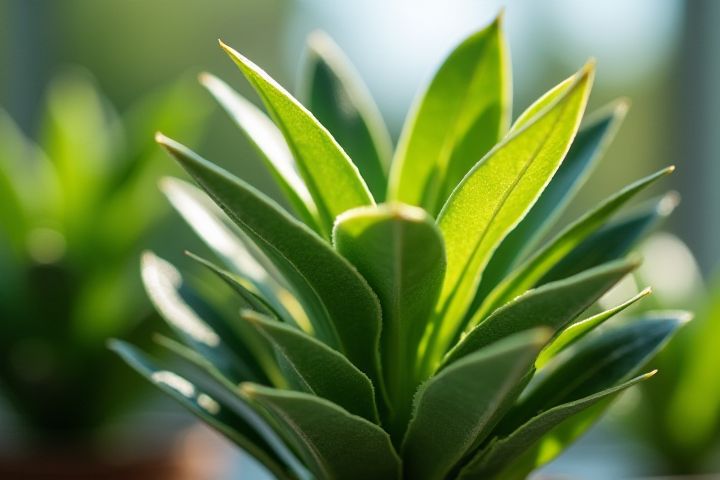
House plants, such as snake plants and peace lilies, improve indoor air quality by absorbing toxins like formaldehyde and benzene. They increase humidity levels, which can alleviate respiratory issues and enhance skin hydration. The presence of greenery has been linked to reduced stress and anxiety, promoting overall mental well-being. Engaging with plants can also boost your mood and productivity, making spaces feel more inviting and vibrant. Furthermore, nurturing houseplants can provide a sense of purpose and fulfillment, enriching your daily life.
Why House Plants Have Health Benefits
Improve air quality
House plants significantly improve air quality by absorbing carbon dioxide and releasing oxygen, which enhances the breathable atmosphere within your home. Many indoor plants, such as the spider plant and peace lily, can filter harmful pollutants like formaldehyde, benzene, and trichloroethylene from the air. By incorporating greenery into your living space, you can reduce common allergens and toxins, promoting better respiratory health. Moreover, the presence of plants can lead to increased humidity levels, providing a more comfortable environment that can alleviate dry skin and respiratory issues.
Reduce stress levels
House plants, such as peace lilies and snake plants, can significantly reduce stress levels in your environment. Research indicates that the presence of greenery can lower cortisol levels, the hormone associated with stress, promoting a sense of calm and relaxation. Engaging with plants, whether through watering or simple observation, fosters a mindful practice that can elevate your mood. You may notice that incorporating plants into your space not only enhances its aesthetic appeal but also contributes to improved mental well-being.
Enhance mood
House plants enhance mood by improving air quality and increasing humidity, which positively affects mental well-being. Research shows that greenery in your living space can reduce stress, leading to lower cortisol levels and promoting relaxation. The act of nurturing plants fosters a sense of responsibility and connection to nature, which can elevate your overall happiness. Incorporating house plants into your environment not only beautifies your home but also serves as a natural remedy for anxiety and depression.
Boost productivity
House plants contribute to increased productivity by enhancing air quality, which can improve cognitive function and focus. Studies reveal that plants can reduce stress levels by up to 30%, fostering a more positive work environment. Integrating greenery into your workspace can also boost creativity, as exposure to natural elements encourages innovative thinking. Investing in house plants not only beautifies your surroundings but also supports your overall mental well-being and efficiency.
Increase humidity
House plants can significantly increase humidity levels in your home, which benefits respiratory health. They release moisture into the air through a process known as transpiration, where water evaporates from their leaves. A higher humidity level, ideally between 30% to 50%, helps alleviate dry skin, throat irritation, and respiratory issues, particularly during winter months when indoor air is often dry. By incorporating just a few plants into your living space, you can create a more comfortable environment that promotes overall well-being.
Promote recovery
House plants play a crucial role in promoting recovery by improving indoor air quality and boosting mental well-being. Research shows that indoor plants can reduce airborne toxins by up to 87% within 24 hours, creating a healthier environment for recovery. Their presence has been linked to lower stress levels, with studies indicating a 30% reduction in stress hormones in those who care for plants. Incorporating greenery into your living space may enhance your mood and accelerate the healing process during times of illness or rehabilitation.
Reduce noise levels
Houseplants significantly contribute to reducing noise levels in indoor environments, acting as natural sound absorbers. Their leaves, stems, and soil can help dampen sound waves, which minimizes echoes and lowers overall noise pollution in your home. This acoustic benefit not only creates a more serene atmosphere but also enhances your ability to concentrate and relax. By incorporating various houseplants into your space, you can enjoy a quieter, more peaceful living environment that promotes mental well-being.
Improve focus
House plants can significantly improve focus by enhancing air quality and creating a calming environment. Studies indicate that indoor plants can reduce levels of air pollutants and increase humidity, which may lead to better cognitive function and concentration. Incorporating green plants, such as snake plants or pothos, into your workspace can lower stress levels by up to 40%, helping you maintain clarity and productivity. A clutter-free and green space not only helps you focus but also boosts overall mood, enhancing your ability to complete tasks efficiently.
Enhance creativity
House plants can significantly enhance creativity by improving your environment and stimulating your mind. Research indicates that being surrounded by greenery can boost mood and cognitive function, with a 15% increase in creative problem-solving reported in individuals working in plant-filled spaces. The presence of plants also helps reduce stress and anxiety, fostering a relaxed atmosphere conducive to creative thought. Incorporating house plants into your workspace not only brightens the room but also paves the way for innovative ideas and elevated productivity.
Lower fatigue
House plants can significantly reduce fatigue by improving indoor air quality. They filter harmful toxins, releasing oxygen that boosts energy levels. The presence of greenery can also elevate mood and enhance mental clarity, leading to increased productivity and lowered feelings of tiredness. Incorporating plants like spider plants or peace lilies into your space may provide a refreshing environment that combats fatigue effectively.
